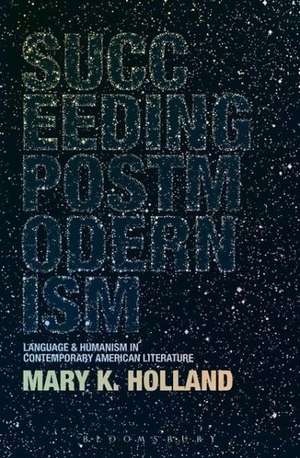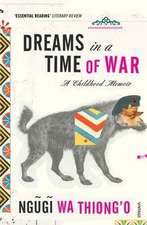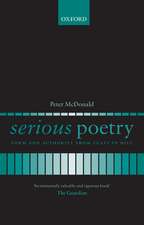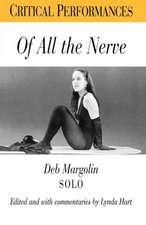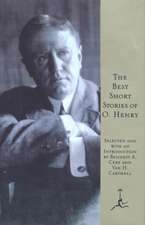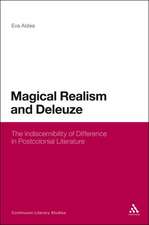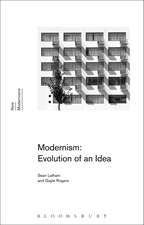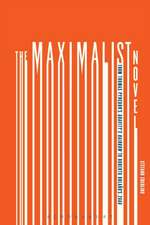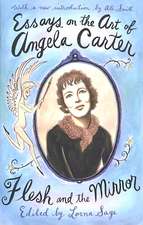Succeeding Postmodernism: Language and Humanism in Contemporary American Literature
Autor Dr. Mary K. Hollanden Limba Engleză Hardback – 19 iun 2013
| Toate formatele și edițiile | Preț | Express |
|---|---|---|
| Paperback (1) | 256.59 lei 6-8 săpt. | |
| Bloomsbury Publishing – 22 oct 2014 | 256.59 lei 6-8 săpt. | |
| Hardback (1) | 772.58 lei 6-8 săpt. | |
| Bloomsbury Publishing – 19 iun 2013 | 772.58 lei 6-8 săpt. |
Preț: 772.58 lei
Preț vechi: 989.74 lei
-22% Nou
Puncte Express: 1159
Preț estimativ în valută:
147.83€ • 154.35$ • 122.35£
147.83€ • 154.35$ • 122.35£
Carte tipărită la comandă
Livrare economică 05-19 aprilie
Preluare comenzi: 021 569.72.76
Specificații
ISBN-13: 9781441130617
ISBN-10: 1441130616
Pagini: 240
Dimensiuni: 155 x 231 x 23 mm
Greutate: 0.45 kg
Ediția:New.
Editura: Bloomsbury Publishing
Colecția Bloomsbury Academic
Locul publicării:New York, United States
ISBN-10: 1441130616
Pagini: 240
Dimensiuni: 155 x 231 x 23 mm
Greutate: 0.45 kg
Ediția:New.
Editura: Bloomsbury Publishing
Colecția Bloomsbury Academic
Locul publicării:New York, United States
Caracteristici
Recognizes a previously unappreciated current of repressed humanism in language-obsessed literature
Notă biografică
Mary K. Holland is Assistant Professor of contemporary literature at The State University of New York, New Paltz, USA. Her work on irony and narcissism, poststructural realism, and mothering and media in fiction and film has appeared in Critique, The Journal of Popular Culture, and A Companion to David Foster Wallace Studies.
Cuprins
Introduction: Writing Postmodern Humanism / 1. "Dead Souls Babbling": Language, Loss, and Community in Don DeLillo's The Names and White Noise 2. "The Art's Heart's Purpose": Braving the Narcissistic Loop of David Foster Wallace's Infinite Jest / 3. A Lamb in Wolf's Clothing: Postmodern Realism in A. M. Homes's Music for Torching and This Book Will Save Your Life / 4. Recuperating the Postmodern Family: Mediating Loss in Mark Danielewski's House of Leaves / 5. Joining Gravity: Making Language Matter in Cormac McCarthy's The Road, Jonathan Safran Foer's Extremely Loud & Incredibly Close, and Steve Tomasula's The Book of Portraiture / 6. "Set [...] down softly beside you": Poststructural Realism in David Foster Wallace's "Octet" and Jonathan Safran Foer's Everything Is Illuminated / Conclusion: Metamodernism / Bibliography / Index
Recenzii
Compelling first book . Holland presents a nuanced reading of contemporary literature's departure from postmodernism.
A fine and close analysis of several American novels written in the twenty-first century allowed her to grasp in them a resistance to the disaffected solipsism bred by the post-cultural culture of mediation and simulation and to anchor late postmodern fiction in a long humanist tradition respectful of individuals and communities.
Holland gives readers a new map of the contemporary novel that registers the landscape with more precision than any earlier scholar-cartographer has managed. Her sequence of finely-grained readings synthesizes the insights of poststructuralism with the urgent impulse toward real meaning and value in twenty-first century fiction, to describe a mobius-strip realism that emerges out of the matter of fiction and that characterizes fiction that matters.
Mary Holland's Succeeding Postmodernism offers a marvelously astute and insightful argument about what she calls a 'new humanism,' a re-assertion of values that matter and inform the struggles articulated in contemporary fictions. Far from naiveté, this is a kind of humanism that takes full account of the anti-humanist tendencies of poststructuralism and yet resolutely insists on the potentiality of language to intervene in meaningful ways in our lives. For scholars of the contemporary period, this is an important text not only to read but also to consider assigning for classes.
Mary Holland was one of the first critics to see that, with the appearance of figures like David Foster Wallace, something fundamental was changing in the landscape of contemporary fiction. And now, with the publication of Succeeding Postmodernism, we at last see her argument presented in full. Rather than the simple collapse of the postmodernist enterprise in favor of a new realist naiveté, the swerve in literary history depicted here is one of repurposing and reclamation, with all of the famed sophistication of the postmodern now dedicated toward envisioning new forms of human connection. Holland's book will be of interest to anyone looking for a penetrating account of the state-and stakes-of artistically ambitious fiction in our time.
For the last decade or so, we've heard a great deal of inconclusive talk about the 'post-postmodern era' and the 'post-ironic' novel. Mary Holland's bracing, densely argued book cuts through all the confusion and offers up a rigorous, firmly grounded overview of this emerging sensibility. Drawing upon recent reevaluations of humanism by Kwame Appiah and Edward Said, Holland discloses unexpected opportunities for empathy and ethical engagement in both poststructuralism and recent fiction by Don DeLillo, David Foster Wallace, Mark Danielewski, A. M. Homes, Jonathan Safran Foer, and Cormac McCarthy. Much like the novels it analyses, Succeeding Postmodernism is both technically dazzling and unapologetically humane.
In this sense, Succeeding Postmodernism is at once a very useful contribution to the field of literary studies...I would recommend it to students of literature.
Holland's Succeeding Postmodernism: Language and Humanism in Contemporary American Literature sees postmodernism as not repudiated but rather redirected so that its strategies and techniques can serve a renewed purpose.Holland's study shows how language can rebuild a sense of hope from the fragments that survive postmodernism's deconstruction.
A fine and close analysis of several American novels written in the twenty-first century allowed her to grasp in them a resistance to the disaffected solipsism bred by the post-cultural culture of mediation and simulation and to anchor late postmodern fiction in a long humanist tradition respectful of individuals and communities.
Holland gives readers a new map of the contemporary novel that registers the landscape with more precision than any earlier scholar-cartographer has managed. Her sequence of finely-grained readings synthesizes the insights of poststructuralism with the urgent impulse toward real meaning and value in twenty-first century fiction, to describe a mobius-strip realism that emerges out of the matter of fiction and that characterizes fiction that matters.
Mary Holland's Succeeding Postmodernism offers a marvelously astute and insightful argument about what she calls a 'new humanism,' a re-assertion of values that matter and inform the struggles articulated in contemporary fictions. Far from naiveté, this is a kind of humanism that takes full account of the anti-humanist tendencies of poststructuralism and yet resolutely insists on the potentiality of language to intervene in meaningful ways in our lives. For scholars of the contemporary period, this is an important text not only to read but also to consider assigning for classes.
Mary Holland was one of the first critics to see that, with the appearance of figures like David Foster Wallace, something fundamental was changing in the landscape of contemporary fiction. And now, with the publication of Succeeding Postmodernism, we at last see her argument presented in full. Rather than the simple collapse of the postmodernist enterprise in favor of a new realist naiveté, the swerve in literary history depicted here is one of repurposing and reclamation, with all of the famed sophistication of the postmodern now dedicated toward envisioning new forms of human connection. Holland's book will be of interest to anyone looking for a penetrating account of the state-and stakes-of artistically ambitious fiction in our time.
For the last decade or so, we've heard a great deal of inconclusive talk about the 'post-postmodern era' and the 'post-ironic' novel. Mary Holland's bracing, densely argued book cuts through all the confusion and offers up a rigorous, firmly grounded overview of this emerging sensibility. Drawing upon recent reevaluations of humanism by Kwame Appiah and Edward Said, Holland discloses unexpected opportunities for empathy and ethical engagement in both poststructuralism and recent fiction by Don DeLillo, David Foster Wallace, Mark Danielewski, A. M. Homes, Jonathan Safran Foer, and Cormac McCarthy. Much like the novels it analyses, Succeeding Postmodernism is both technically dazzling and unapologetically humane.
In this sense, Succeeding Postmodernism is at once a very useful contribution to the field of literary studies...I would recommend it to students of literature.
Holland's Succeeding Postmodernism: Language and Humanism in Contemporary American Literature sees postmodernism as not repudiated but rather redirected so that its strategies and techniques can serve a renewed purpose.Holland's study shows how language can rebuild a sense of hope from the fragments that survive postmodernism's deconstruction.
